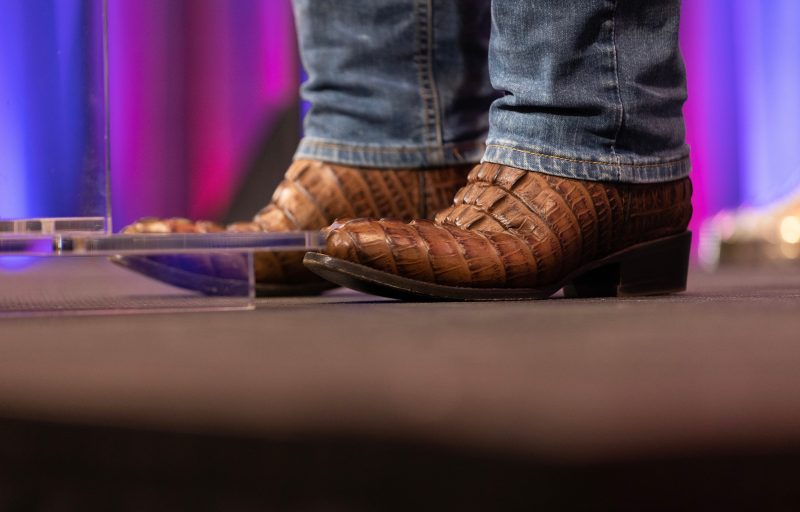Florida Gov. Ron DeSantis (R) probably doesn’t enjoy being reminded of it, but his current position and prominence are due in large part to Donald Trump, the man he is failing to supplant as the front-runner for the 2024 Republican presidential nomination.
DeSantis’s regular Trump-boosting appearances on Fox News are generally credited with the then-president’s endorsing then-Rep. DeSantis’s bid for the Republican gubernatorial nomination in 2018. DeSantis ran a campaign ad so sycophantic to Trump that year that it made national headlines. That November, he narrowly edged out his Democratic rival and won the governorship.
His narrow margin wasn’t exceptional; the Republican challenger to incumbent Sen. Bill Nelson, Gov. Rick Scott, also only barely won. Four years later, running a reelection campaign focused heavily on his laissez-infecter attitude to the coronavirus pandemic — stoking a sentiment that Trump himself had fostered in the run-up to the 2020 election — DeSantis won reelection by a wide margin. But then, so did Sen. Marco Rubio (R-Fla.). Rubio got 58 percent of the vote to DeSantis’s 59. Whatever political magic DeSantis believed he had captured was good for about 139,000 more votes than the 4.5 million Rubio got.
But DeSantis, unlike Rubio, was a darling of the right-wing conversation. Trump’s efforts to retain his office had forced him to withdraw from the spotlight, at first rather sheepishly and then as a function of losing his social media accounts. DeSantis commanded the attention of Fox News and other media outlets by weaving various trendy issues — the fight against “woke,” mentions of LGBTQ+ relationships, voting restrictions — into policy or executive orders. He became the Guy Who Might Defeat Trump, including in his own estimation.
It’s hard to overstate the importance of that period in 2021 and 2022 when DeSantis was the torchbearer of the Trumpian approach to politics. He himself generally declined to go full-bore against his critics and opponents in the Trump manner, but he had a team of folks very eager to do so. And they had a vast pool of angry online commentators willing to direct their fire at suggested enemies, a pool once largely directed by Trump and his operation. Here, too, DeSantis had been handed an advantage by Trump that he put to his own use.
You see the problem. Soon after the 2022 election, as DeSantis was basking in his (and Rubio’s) success, Trump formalized his bid for the 2024 nomination. Suddenly, he regained relevance and media attention. The creation of Truth Social gave him a way to opine on things — and for others to elevate and share what he was saying. And by the beginning of this year, he was using his platform to attack DeSantis.
Those on DeSantis’s team thought they owned the online conversation. They soon learned that, to a large extent, they were renting it. And that brings us to the boots.
In March, before DeSantis announced his campaign but after he was already losing ground to Trump in national polling, online observers began to notice the governor’s predilection for heeled boots. Boots that often had substantial heels. There is plenty of research suggesting that voters prefer taller candidates, and DeSantis’s tacking on an inch seemed that it might be a conscious effort to narrow the height gap with the taller Trump.
Trump’s social media team made boot jokes sporadically over the past few months, hinting that DeSantis was insecure or a phony or, really, once again struggling to measure up to Trump.
Then, last month, DeSantis went on Bill Maher’s HBO show. He sat in a chair opposite Maher, again sporting boots. A TikTok user clipped part of the appearance and sketched in an approximation of where DeSantis’s feet would be — suggesting not only that he was using heels to appear taller but also lifts inside the shoes themselves. That video has 14.3 million views as of writing.
In part, that’s because DeSantis was asked about it during a podcast interview last week. Host Patrick Bet-David asked DeSantis how tall he was (“5-11,” the governor replied) and suggested that he put on normal shoes to answer questions about his height. DeSantis demurred.
The video’s popularity probably is due in part also to Trump’s posting stills from it on Truth Social, where thousands reshared the images.
Now it has all blown up into what Trump fans (and others) have dubbed “Bootgate.” Politico ran a story — written by social media menswear celebrity Derek Guy — in which various boot- and shoemakers indicated their belief that DeSantis was, in fact, heightening. Late-night TV did its jokes. The Trump team sent out the latest news release in its “Kiss of Death” series about DeSantis’s campaign, suggesting that the governor’s shoes “are more appropriate for America’s Next Top Model than the campaign trail.”
The unsubtle subtext of femininity here plays into it, too. DeSantis has tried to run as the defender of individual freedom and bulwark against the nanny state. It helped him carve out his own niche in the online conversation among hard-right young men who framed his candidacy as a less-malleable iteration of Trump’s fringe politics. That’s hard to reconcile with a guy who also might be worried that he looks short.
But Bootgate is a symptom, not the disease. As the New York Times wrote last month, DeSantis figured that his campaign could outmaneuver Trump online, using his team’s experience in social media battles to keep Trump on his heels (so to speak). But that experience was earned on terrain that Trump helped shape and — particularly once DeSantis’s bid for the nomination began more obviously to falter — the online conversation turned against him.
By this time next year, DeSantis is unlikely to be the Republican nominee for president. He may, instead, be the Florida governor who is eventually remembered for his shoes.








